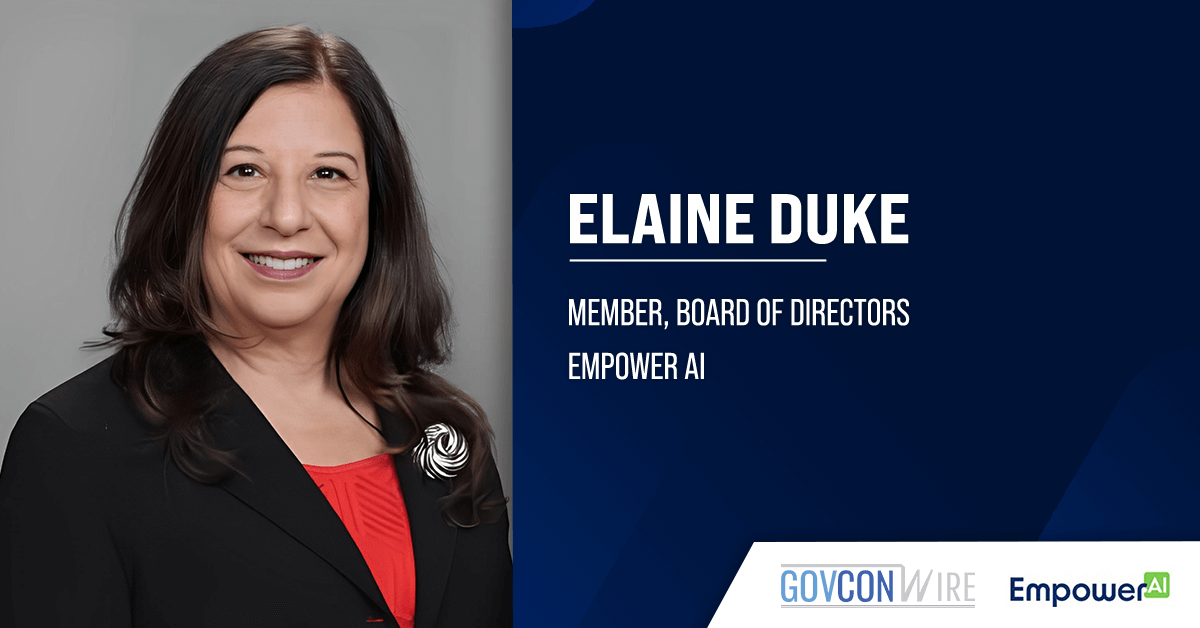The national security landscape has changed dramatically in recent years, and the United States’ security agencies are dealing with unprecedented challenges. GovCon Wire sat down with former Deputy Secretary and Acting Secretary of the Department of Homeland Security Elaine Duke to take a closer look at the national security challenges facing the U.S. and how agencies are tackling these issues.
Duke joined the Empower AI board of directors in September 2024. Read her full Executive Spotlight interview below.
GovCon Wire: Elaine, can you give your perspective on artificial intelligence and what drew you to Empower AI?
Elaine Duke: During my time in government, it became evident that artificial intelligence could deliver the timely and type of data needed to drive key decisions. When I was in the roles of deputy and acting secretary of the Department of Homeland Security, I needed to make decisions quickly and with as much accurate input in the time necessary.
What drew me to Empower AI specifically was the company culture. It’s a company where teams work well together to serve as a partner to government and focus on agency missions — that comes through clearly.
Also attractive is the company’s size. Empower AI is mid-tier, so they’re big enough to address mission-critical needs through AI, but they’re small enough to be nimble and adjust to evolving federal agency needs. Staff know they are important contributors and have shown how well they adapt with AI-driven IT solutions in support of defense and civilian agencies. This presents opportunities for Empower AI to expand its footprint into other mission spaces needing automation, IT service management, cloud services and infrastructure modernization.
GCW: Tell me about the current state of the artificial intelligence market. Where are you seeing new opportunities in AI, and where do you think the market is heading?
Duke: Even though we all use AI every day, from Amazon Alexa to online customer support chat bots, concern remains about biases in AI models, the data they are trained on and their outcomes. Will it give me the information I need and process it accurately? Are leaders vigilant about the cybersecurity and privacy associated with the data?
There’s generally a lag time between technology reaching a reliable stage and people trusting it. We’ll get there with more AI use cases that support federal missions. In DHS there are many citizen-facing and mission-critical services that require AI to process lots of data and accelerate decision making. Processing applications for citizenship, correlating threat data from different vectors, connecting resources and issuing alerts — all these needs are driving the demand for AI and building trust among stakeholders.
AI also brings a better customer experience to interactions with federal agencies and can improve relationships with constituents through faster responses. Ultimately, all this infusion of AI will make it mature enough that it’s not a separate science but instead is built into everything we do.
GCW: One of the most pressing concerns about data in today’s digital landscape is the sheer amount of it there is to be processed and sorted. What do you see as some of the more viable solutions to tackling this challenge?
Duke: AI is great for processing large data sets and accelerating decision-making processes. It delivers the automation, predictive analytics and intelligent systems that lead to better mission outcomes. A modernized infrastructure offers the right environment for data management with built-in capabilities for data capture, security, processing and most importantly data sharing within and among agencies.
Most federal agencies cannot give up control of their data, especially law enforcement agencies. We need capabilities that facilitate data and insight sharing while allowing stakeholders to maintain control over their data.
GCW: What are the most pressing national security threats we face today?
Duke: Non-state actors, terrorists, cyber threats by unknown perpetrators and even the merging of state actors with terrorist groups — they may not be on anyone’s radar until they commit a heinous act. This is different from traditional criminals who have a predictable trajectory of activity.
National security still is thought of more in the realm of the Department of Defense and involves activities on foreign soil. However, globalization and the relative accessibility of critical infrastructure has created the environment for threats to flourish, and this is blending the homeland security and national security missions. We need to anticipate problems, and be fast in our actions and reactions, which is where AI comes in.
GCW: There’s competition for employees between government and industry. Where does AI fit into this?
Duke: For government employees, the passion for public service remains strong. I know I’ll never surpass the experience of being a federal employee because it was an unbelievable privilege and honor, and I think a lot of civil servants feel that.
But there are challenges to being part of the federal workforce. The removal of civil service protections and sunsetting of the old retirement system are just two factors that make it harder for agencies to compete with contractors for the same pool of employees. AI presents a perfect opportunity as a force multiplier, able to supplement the workforce and maintain the necessary level of output. It handles the routine tasks while leaving other critical-thinking duties to humans.
Augmenting the workforce with technology is why partnerships with companies such as Empower AI are so important, too. They ensure that the critical work gets accomplished.



